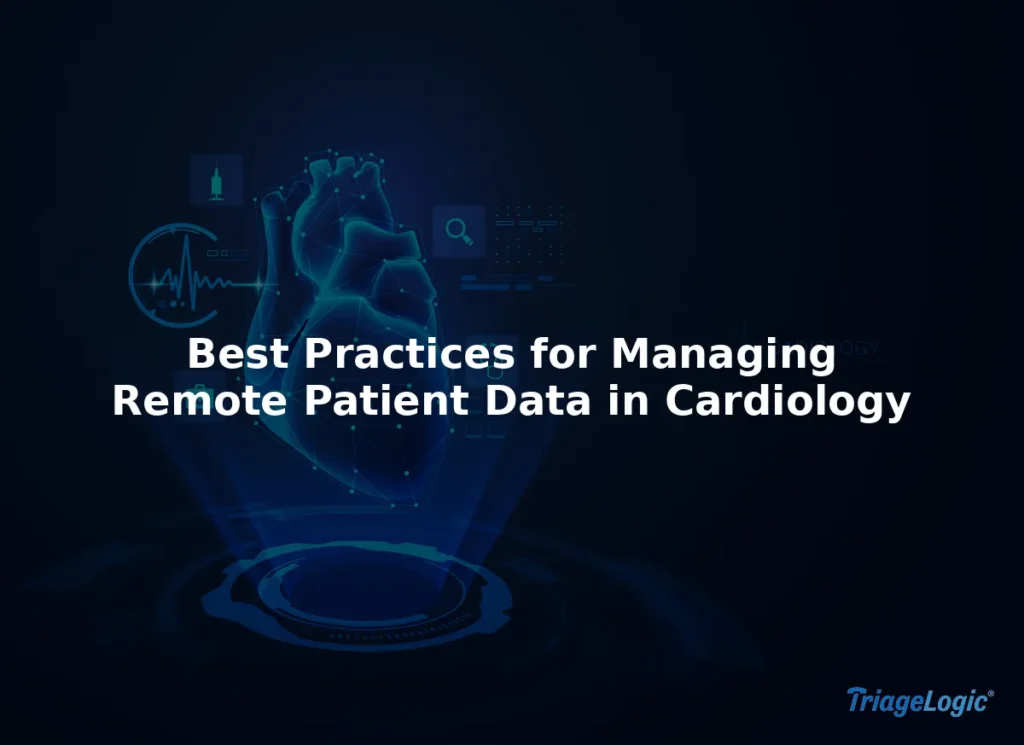Best Practices for Managing Remote Patient Data in Cardiology
Cardiologists are relying more on remote patient monitoring (RPM) to provide proactive care to those suffering from hypertension, heart failure, and other chronic conditions. But effective RPM isn’t just about collecting data — it’s about organizing it efficiently, securely, and in a way that supports clinical decisions. Implementing best practices for managing remote patient data in cardiology ensures that providers stay compliant, informed, and prepared to act on real-time insights. Below, we explore those practices in more detail, and how TriageLogic’s RemotePatientPro™ (RPP) can benefit your team’s efforts.
Why Data Management Is Key in Cardiac RPM Programs
RPM records a lot of data about patient vital signs — blood pressure, oxygen saturation, and heart rate, among others. Without proper systems and workflows, this data can overwhelm staff, go unreviewed, or be stored insecurely. The best practices for managing remote patient data in cardiology are essential to avoid alert fatigue, meet HIPAA requirements, and optimize patient outcomes.
Best Practices for Managing Remote Patient Data in Cardiology
- Use HIPAA-Compliant Platforms: Ensure all data is transmitted, stored, and accessed through encrypted, secure systems like RemotePatientPro.
- Implement Role-Based Access: Limit who can view or edit patient data within your practice to minimize risk and maintain compliance.
- Leverage Clinical Triage Support: Rather than be overwhelmed by the sheer volume of patient data, use outsourced nurse support to review and escalate cases that are urgent.
- Set Clear Data Review Protocols: Establish who reviews RPM data, how often, and what actions are taken based on readings.
- Automate Documentation: Choose platforms that log alerts, interventions, and patient responses automatically to simplify charting and billing.
How to Apply These Best Practices
If you decide to implement RemotePatientPro, your team will be able to monitor vitals across dozens of cardiac patients. Each patient’s data will be automatically sent to a secure private cloud, where our triage nurses will review it and prioritize the patient’s needs accordingly. Your cardiologists will only receive alerts when actions are required. This ensures that the data is consistently managed, clinically actionable, and properly documented.
Efficiency and Compliance in One Workflow
By following these best practices, your team can avoid data overload, improve patient follow-ups, and maintain compliance with industry regulations. Your staff will know what to expect in terms of notifications and alerts, and your patients will feel confident that their health information is in safe hands.
Why Choose RPP and TriageLogic
RemotePatientPro offers a secure, scalable platform designed for cardiology. It integrates seamlessly with practice workflows and automatically logs all clinical activity, while our experienced RNs review incoming data and ensure no critical trends are missed.
Manage Cardiac RPM Data With Confidence
If you’re ready to implement or improve an RPM program, or have questions about these best practices, we want to hear from you! Schedule a consultation to learn more about RPP and how it can benefit your team.

